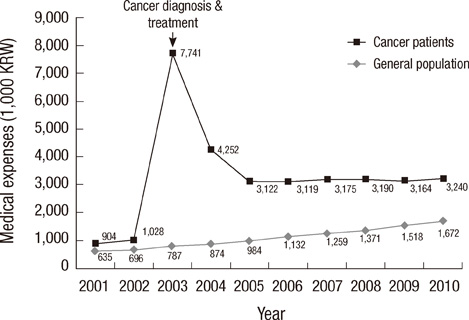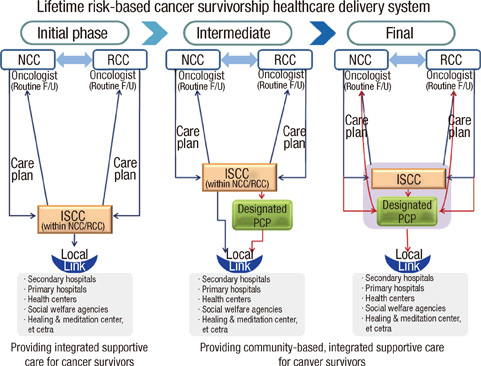Management of Cancer Survivors in Clinical and Public Health Perspectives: Current Status and Future Challenges in Korea
- Affiliations
-
- 1Department of Family Medicine & Health Promotion Center, Seoul National University Hospital, Seoul, Korea.
- 2Cancer Survivorship Clinic, Seoul National University Cancer Hospital, Seoul, Korea.
- 3Cancer Policy Branch, National Cancer Control Research Institute, National Cancer Center, Goyang, Korea. whitemiso@ncc.re.kr
- 4Division of Disease Policy, Ministry of Health and Welfare, Seoul, Korea.
- KMID: 1777550
- DOI: http://doi.org/10.3346/jkms.2013.28.5.651
Abstract
- The number of cancer survivors is increasing dramatically. Many cancer survivors face lifetime risks associated with their cancer therapy, with a significant proportion at risk for serious morbidity and premature mortality. Concerns regarding the long-term physical, psychosocial, and economic effects of cancer treatment on cancer survivors and their families are increasingly being recognized and addressed by public and private sector. This article summarizes economic burden of cancer survivors, main post-treatment health problems including secondary primary cancer and comorbidities, health behaviors such as smoking, exercise and physical activity, nutrition, and psychosocial problems. Faced with various health and psychosocial problems specific to this population, several healthcare and policy models are being suggested to address these issues, including 'shared care model' and 'integrative supportive care service delivery system for cancer survivors'. More effort is needed to make the cancer survivorship agenda a reality, attended by a wide variety of stakeholders including researchers, patients, providers, and policy makers.
Keyword
MeSH Terms
Figure
Cited by 6 articles
-
Second Primary Cancer after Treating Gastrointestinal Cancer
Jeong Youp Park
Korean J Gastroenterol. 2019;74(4):193-196. doi: 10.4166/kjg.2019.74.4.193.Characteristics and Survival of Breast Cancer Patients with Multiple Synchronous or Metachronous Primary Cancers
Janghee Lee, Seho Park, Sanghwa Kim, Jeeye Kim, Jegyu Ryu, Hyung Seok Park, Seung Il Kim, Byeong-Woo Park
Yonsei Med J. 2015;56(5):1213-1220. doi: 10.3349/ymj.2015.56.5.1213.Management of cancer survivors in Korea
Dong Wook Shin, Sung Sunwoo, Jungkwon Lee
J Korean Med Assoc. 2015;58(3):216-226. doi: 10.5124/jkma.2015.58.3.216.Management of long-term cancer survivors in primary care
Dong Wook Shin, Jungkwon Lee
J Korean Med Assoc. 2016;59(4):252-255. doi: 10.5124/jkma.2016.59.4.252.A prospective study on changes in body composition and fat percentage during the first year of cancer treatment in children
Hye Ran Yang, Hyoung Soo Choi
Nutr Res Pract. 2019;13(3):214-221. doi: 10.4162/nrp.2019.13.3.214.Risky Lifestyle Behaviors among Gastric Cancer Survivors Compared with Matched Non-cancer Controls: Results from Baseline Result of Community Based Cohort Study
Minkyung Kim, Kui Son Choi, Mina Suh, Jae Kwan Jun, Kumban Walter Chuck, Boyoung Park
Cancer Res Treat. 2018;50(3):738-747. doi: 10.4143/crt.2017.129.
Reference
-
1. Jung KW, Park S, Kong HJ, Won YJ, Boo YK, Shin HR, Park EC, Lee JS. Cancer statistics in Korea: incidence, mortality and survival in 2006-2007. J Korean Med Sci. 2010. 25:1113–1121.2. National Cancer Center (Korea). Cancer facts and figures. 2012. Goyang: National Cancer Center.3. Mullan F. Seasons of survival: reflections of a physician with cancer. N Engl J Med. 1985. 313:270–273.4. Kim J, Hahm MI, Park EC, Park JH, Park JH, Kim SE, Kim SG. Economic burden of cancer in South Korea for the year 2005. J Prev Med Public Health. 2009. 42:190–198.5. Curtis RE, Freedman DM, Ron E, Ries LA, Hacker DG, Edwards BK, Tucker MA, Fraumeni JFJ. New malignancies among cancer survivors: SEER cancer registries, 1973-2000. 2006. Bethesda: National Cancer Institute.6. Dong C, Hemminki K. Second primary neoplasms in 633,964 cancer patients in Sweden, 1958-1996. Int J Cancer. 2001. 93:155–161.7. Tabuchi T, Ito Y, Ioka A, Miyashiro I, Tsukuma H. Incidence of metachronous second primary cancers in Osaka, Japan: update of analyses using population-based cancer registry data. Cancer Sci. 2012. 103:1111–1120.8. Nielsen SF, Nordestgaard BG, Bojesen SE. Associations between first and second primary cancers: a population-based study. CMAJ. 2012. 184:E57–E69.9. Schaapveld M, Visser O, Louwman MJ, de Vries EG, Willemse PH, Otter R, van der Graaf WT, Coebergh JW, van Leeuwen FE. Risk of new primary nonbreast cancers after breast cancer treatment: a Dutch population-based study. J Clin Oncol. 2008. 26:1239–1246.10. Cho J, Guallar E, Hsu YJ, Shin DW, Lee WC. A comparison of cancer screening practices in cancer survivors and in the general population: the Korean National Health and Nutrition Examination Survey (KNHANES) 2001-2007. Cancer Causes Control. 2010. 21:2203–2212.11. Shin DW, Kim YW, Oh JH, Kim SW, Chung KW, Lee WY, Lee JE, Lee WC, Guallar E, Cho J. Knowledge, attitudes, risk perception, and cancer screening behaviors among cancer survivors. Cancer. 2011. 117:3850–3859.12. Shin DW, Baik YJ, Kim YW, Oh JH, Chung KW, Kim SW, Lee WC, Yun YH, Cho J. Knowledge, attitudes, and practice on second primary cancer screening among cancer survivors: a qualitative study. Patient Educ Couns. 2011. 85:74–78.13. Shin DW, Kim Y, Baek YJ, Mo HN, Choi JY, Cho J. Oncologists experience with second primary cancer screening: current practices and barriers and potential solutions. Asian Pac J Cancer Prev. 2012. 13:671–676.14. Shin DW, Cho J, Kim YW, Oh JH, Kim SW, Chung KW, Lee WY, Lee JE, Guallar E, Lee WC. Efficacy of an educational material on second primary cancer screening practice for cancer survivors: a randomized controlled trial. PLoS One. 2012. 7:e33238.15. Shin DW, Nam JH, Kwon YC, Park SY, Bae DS, Park CT, Cho CH, Lee JM, Park SM, Yun YH. Comorbidity in disease-free survivors of cervical cancer compared with the general female population. Oncology. 2008. 74:207–215.16. Shin DW, Ahn E, Kim H, Park S, Kim YA, Yun YH. Non-cancer mortality among long-term survivors of adult cancer in Korea: national cancer registry study. Cancer Causes Control. 2010. 21:919–929.17. Earle CC, Neville BA. Under use of necessary care among cancer survivors. Cancer. 2004. 101:1712–1719.18. Shin DW, Park JH, Park JH, Park EC, Kim SY, Kim SG, Choi JY. Antihypertensive medication adherence in cancer survivors and its affecting factors: results of a Korean population-based study. Support Care Cancer. 2010. 19:211–220.19. Kenfield SA, Stampfer MJ, Chan JM, Giovannucci E. Smoking and prostate cancer survival and recurrence. JAMA. 2011. 305:2548–2555.20. Parsons A, Daley A, Begh R, Aveyard P. Influence of smoking cessation after diagnosis of early stage lung cancer on prognosis: systematic review of observational studies with meta-analysis. BMJ. 2010. 340:b5569.21. De Bruin-Visser JC, Ackerstaff AH, Rehorst H, Retèl VP, Hilgers FJ. Integration of a smoking cessation program in the treatment protocol for patients with head and neck and lung cancer. Eur Arch Otorhinolaryngol. 2012. 269:659–665.22. Meyerhardt JA, Giovannucci EL, Holmes MD, Chan AT, Chan JA, Colditz GA, Fuchs CS. Physical activity and survival after colorectal cancer diagnosis. J Clin Oncol. 2006. 24:3527–3534.23. Schmitz KH, Courneya KS, Matthews C, Demark-Wahnefried W, Galvão DA, Pinto BM, Irwin ML, Wolin KY, Segal RJ, Lucia A, et al. American College of Sports Medicine roundtable on exercise guidelines for cancer survivors. Med Sci Sports Exerc. 2010. 42:1409–1426.24. Chlebowski RT, Blackburn GL, Thomson CA, Nixon DW, Shapiro A, Hoy MK, Goodman MT, Giuliano AE, Karanja N, McAndrew P, et al. Dietary fat reduction and breast cancer outcome: interim efficacy results from the Women’s Intervention Nutrition Study. J Natl Cancer Inst. 2006. 98:1767–1776.25. Rock CL, Doyle C, Demark-Wahnefried W, Meyerhardt J, Courneya KS, Schwartz AL, Bandera EV, Hamilton KK, Grant B, McCullough M, et al. Nutrition and physical activity guidelines for cancer survivors. CA Cancer J Clin. 2012. 62:243–274.26. Ahn E, Shin DW, Cho SI, Park S, Won YJ, Yun YH. Suicide rates and risk factors among Korean cancer patients, 1993-2005. Cancer Epidemiol Biomarkers Prev. 2010. 19:2097–2105.27. Natoinal Cancer Center (Korea). Recommendations for distress management in cancer patients. 2009. Goyang: National Cancer Center.28. Eom CS, Shin DW, Kim SY, Yang HK, Jo HS, Kweon SS, Kang YS, Kim JH, Cho BL, Park JH. Impact of perceived social support on the mental health and health-related quality of life in cancer patients: results from a nationwide, multicenter survey in South Korea. Psychooncology. 2012. doi: 10.1002/pon.3133.29. Park JH, Park EC, Park JH, Kim SG, Lee SY. Job loss and re-employment of cancer patients in Korean employees: a nationwide retrospective cohort study. J Clin Oncol. 2008. 26:1302–1309.30. Lee MK, Lee KM, Bae JM, Kim S, Kim YW, Ryu KW, Lee JH, Noh JH, Sohn TS, Hong SK, et al. Employment status and work-related difficulties in stomach cancer survivors compared with the general population. Br J Cancer. 2008. 98:708–715.31. Ahn E, Cho J, Shin DW, Park BW, Ahn SH, Noh DY, Nam SJ, Lee ES, Yun YH. Impact of breast cancer diagnosis and treatment on work-related life and factors affecting them. Breast Cancer Res Treat. 2009. 116:609–616.32. Cho J, Smith K, Choi EK, Kim IR, Chang YJ, Park HY, Guallar E, Shim YM. Public attitudes toward cancer and cancer patients: a national survey in Korea. Psychooncology. 2012. doi: 10.1002/pon.3041.33. Shin DW, Kim SY, Cho J, Sanson-Fisher RW, Guallar E, Chai GY, Kim HS, Park BR, Park EC, Park JH. Discordance in perceived needs between patients and physicians in oncology practice: a nationwide survey in Korea. J Clin Oncol. 2011. 29:4424–4429.34. Hewitt M, Greenfield S, Stovall E. From cancer patient to cancer survivor: lost in transition. 2006. Washington, D.C.: The National Academies Press.35. Oeffinger KC, McCabe MS. Models for delivering survivorship care. J Clin Oncol. 2006. 24:5117–5124.36. Cheung WY, Neville BA, Cameron DB, Cook EF, Earle CC. Comparisons of patient and physician expectations for cancer survivorship care. J Clin Oncol. 2009. 27:2489–2495.37. Mao JJ, Bowman MA, Stricker CT, DeMichele A, Jacobs L, Chan D, Armstrong K. Delivery of survivorship care by primary care physicians: the perspective of breast cancer patients. J Clin Oncol. 2009. 27:933–938.38. Shim EJ, Lee KS, Park JH, Park JH. Comprehensive needs assessment tool in cancer (CNAT): the development and validation. Support Care Cancer. 2011. 19:1957–1968.39. Shin DW, Park JH, Shim EJ, Park JH, Choi JY, Kim SG, Park EC. The development of a comprehensive needs assessment tool for cancer-caregivers in patient-caregiver dyads. Psychooncology. 2011. 20:1342–1352.40. Natoinal Cancer Center (Korea). Development of delivery system for integrated supportive cancer survivor care. 2011. Goyang: National Cancer Center.
- Full Text Links
- Actions
-
Cited
- CITED
-
- Close
- Share
- Similar articles
-
- Cancer Survivorship Care and Roles of Oncology Nurses
- Opportunities and Challenges for both National and International Public Health Area: The Public Health Sector in Government
- Current status of the management of cancer patients in Korea
- Cancer Survivors and Returning to Work Perspectives from Occupational Health Physicians in Korea
- Prediction of cancer survivors’ mortality risk in Korea: a 25-year nationwide prospective cohort study




